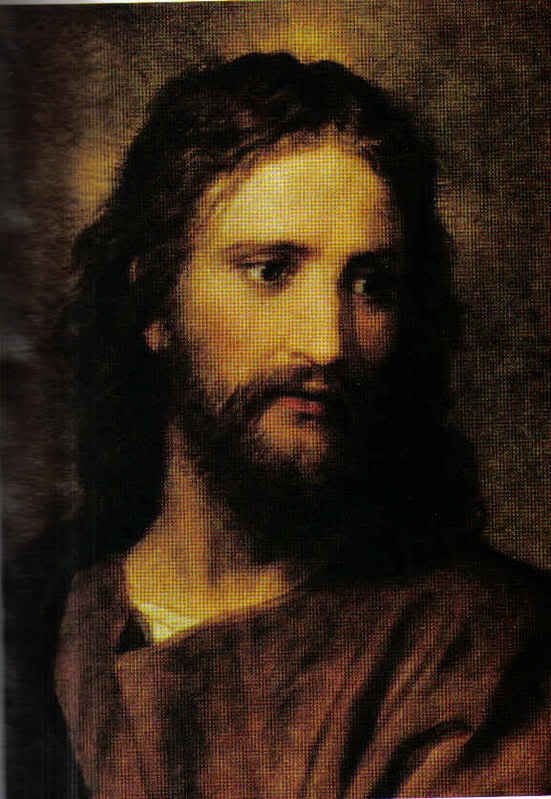In answer to the previous post, "How to discuss the divine nature", I posted this in a group forum on Myspace:
In the beginning was the Word, and the Word was with God, and the Word was God...And the Word was made flesh, and dwelt among us Jn 1:1, 14a.
And without controversy great is the mystery of godliness: God was manifest in the flesh, justified in the Spirit, seen of angels, preached unto the Gentiles, believed on in the world, received up into glory. 1Tim 3:16
Herein is our love made perfect, that we may have boldness in the day of judgment: because as he is, so are we in this world. 1Jn 4:17
As Christians we believe that the Lord Jesus Christ was God incarnate. As such, He is theanthropic, that is both God and man. This is what is the dual nature of Christ, meaning that He has two natures, divine and human in one person. Hence, one Person, two Natures. This as neither dividing the Person, nor confounding the Natures. He may act through either nature.
This is the mystery of godliness, as said Paul, using the Greek word eusebeia, which means 1) reverence, respect; 2) piety towards God, godliness Thayers. In other words, the mystery of having a proper attitude of reverence, respect, and courtesy toward God is the very incarnation of deity into flesh and blood. But how does this concern Jesus Himself? He already lived a completely obedient life, in complete godliness toward God, so does this mystery then end? No. The mystery of godliness continues through us. How? By the divine incarnating through our flesh and blood.
As we read above, the apostle John says that we are now in this world (not in the sweet by-and-by) as He is, which is the same yesterday, today and forever (Heb 13:8). This is amazing! That puts us in the same predicament of being theanthropic as we live in this world. Now, understand this: we are not divine in our creature-hood, or as His creations. In fact, in ourselves we are as nothing. So, we cannot solely point to our humanity and say, "I’m divine, I’m God", no. But we point toward His divinity within us, as we bow out, and disappear in ourselves, and we let God arise, and His enemies be scattered (Ps 68:1). Also understand that our human nature is not evil in and of itself. Its only what we’ve done with, or from our flesh that has been evil. But our sins our washed away by His blood. And now, through the divine nature, God in us, we are able to manifest in our flesh a godliness, and holy living not possible before. Before, we just tried to keep the commandments in our own human nature, and effort, always falling, and coming short of His glory. But now, we have another nature to obey Him from, to love from, and from which to just be.
When Christ the Logos entered humanity, He changed things up: The kingdom of heaven is like unto leaven, which a woman took, and hid in three measures of meal, till the whole was leavened. Mt 13:33. The woman is Sophia-wisdom (Prov 8-9), and the Kingdom of heaven here is the divine nature hidden in 3 measures of meal: our spirit, soul, and body, lies dormant until we as Christians learn to realize Who we are in Him, and begin to access this, and grow into That.
Consider this thorough mixing together of two natures when Christ entered into humanity:
Forasmuch then as the children are partakers of flesh and blood, he also himself likewise took part of the same; that through death he might destroy him that had the power of death, that is, the devil Heb 2:14
Whereby are given unto us exceeding great and precious promises: that by these ye might be partakers of the divine nature, having escaped the corruption that is in the world through lust.
Now the word used above by Peter might be, is ginomai in the Greek, meaning
1) to become, i.e. to come into existence, begin to be, receive being
2) to become, i.e. to come to pass, happen
2a) of events
3) to arise, appear in history, come upon the stage
3a) of men appearing in public
4) to be made, finished
4a) of miracles, to be performed, wrought
5) to become, be made Thayers Greek Definitions
Thus to participate, share in, or have in common the divine nature is something we must grow into, in terms of realization. The divine nature is not something additional to salvation, but a very part of our new birth experience. We have the divine nature now, it is up to us how much we want to clear away the clouds of ignorance, and realize God within us.
This is the prayer of Jesus for our maturing in the divine Oneness, which is the same Oneness He shares with the Father: And the glory which thou gavest me I have given them; that they may be one, even as we are one: I in them, and thou in me, that they may be made perfect in one; and that the world may know that thou hast sent me, and hast loved them, as thou hast loved me. Jn 17:22-23. This passage tells us at least 3 things:
1. This Oneness is the same Oneness shared between the Persons of the Trinity; 2. He gives us glory, which is His kabod-glory, or divine Presence, to help us realize this nature; and 3. We are to as believers be made perfect, that is, mature in this Oneness.
This was also Paul’s prayer: For this cause I bow my knees unto the Father of our Lord Jesus Christ... And to know the love of Christ, which passeth knowledge, that ye might be filled with all the fullness of God. Eph 3:19 [read the whole prayer, its amazing!]. And this is the duty of spiritual gift-ministry to bring us into this fullness: For the perfecting of the saints, for the work of the ministry, for the edifying of the body of Christ: Till we all come in the unity of the faith, and of the knowledge of the Son of God, unto a perfect man, unto the measure of the stature of the fullness of Christ Eph 4:12-13
This is my prayer this morning, that we would awaken to the divine nature within us. That, while yes, we have our human nature, we also have deity incarnate within us, even as it was in Christ. In fact, as the Body of Christ, we are a continuation of His Holy Incarnation, amen. As the continuation of, and individual experience of the theanthropos (God/man) we should be able to act out of either nature, as the Spirit leads, and be Christ to a lost and dying world.
Be blessed, and be all He is in us.
In Jesus’ name, Amen.
Sunday, July 27, 2008
Wednesday, July 16, 2008
Discussing the Divine Nature
How do we discuss the divine nature with other believers as a doctrine to be embraced, or rather as a Reality to realize?
We know 2Pet 1:4b states ...that ye might be partakers of the divine nature, having escaped the corruption that is in the world through lust. To 'partake' of the divine nature is to share in, to have in common with, to participate in. The divine nature being the Godhead, is the very nature of deity, His Essence, His Oneness, Absolute transcendence, and His immutable Being.
This blog entry is not meant to be an exposition of the doctrine itself, but rather a discussion as to how this doctrine is to be presented to other believers who may not be inclined to accept it.
The question of 'should' we share this doctrine I think is settled by the fact that the purpose of the 5-fold ministry (Eph 4:11) is to bring believers to a place of the very fullness of Christ, which would include a full participation in, and as the divine nature. And in Jesus' prayer, He prayed that we all might be one even as He is One with the Father (Jn 17:x). Also, He taught in that prayer that we mature in that Oneness (v.x). It is in our realization of our Oneness with God in the divine nature that we mature as believers.
Thus the question is not "should we...", but "how do we..." discuss this doctrine with other believers.
This is a question I'll explore in the near future, God willing. Or, if other wish to chime in, they can leave a comment. But this is something on my heart, and as soon as I receive more light on it, or if I discuss some experiences I've had discussing this doctrine, I'll create another post.
Thank you, and God bless.
We know 2Pet 1:4b states ...that ye might be partakers of the divine nature, having escaped the corruption that is in the world through lust. To 'partake' of the divine nature is to share in, to have in common with, to participate in. The divine nature being the Godhead, is the very nature of deity, His Essence, His Oneness, Absolute transcendence, and His immutable Being.
This blog entry is not meant to be an exposition of the doctrine itself, but rather a discussion as to how this doctrine is to be presented to other believers who may not be inclined to accept it.
The question of 'should' we share this doctrine I think is settled by the fact that the purpose of the 5-fold ministry (Eph 4:11) is to bring believers to a place of the very fullness of Christ, which would include a full participation in, and as the divine nature. And in Jesus' prayer, He prayed that we all might be one even as He is One with the Father (Jn 17:x). Also, He taught in that prayer that we mature in that Oneness (v.x). It is in our realization of our Oneness with God in the divine nature that we mature as believers.
Thus the question is not "should we...", but "how do we..." discuss this doctrine with other believers.
This is a question I'll explore in the near future, God willing. Or, if other wish to chime in, they can leave a comment. But this is something on my heart, and as soon as I receive more light on it, or if I discuss some experiences I've had discussing this doctrine, I'll create another post.
Thank you, and God bless.
Subscribe to:
Posts (Atom)

